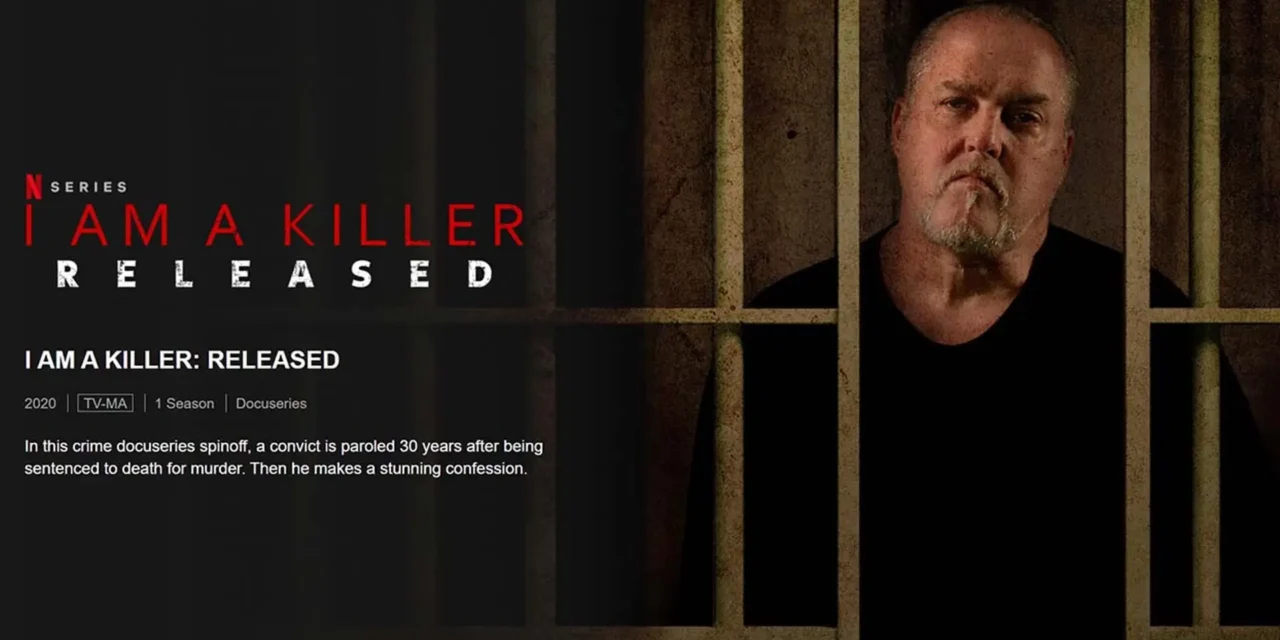What caught my attention in, I Am a Killer Released, was the snippet:
In this crime docuseries spinoff, a convict is paroled 30 years after being sentenced to death for murder. Then he makes a stunning confession.
I hovered over the movie cover and let the app notice that I was interested, it then played the trailer. I heard this murderer talk about God and how his life was changed. I was sold and clicked the Play link.
Many Americans believe that they have an attitude that there is goodness in all people.
But the truth is, when we see a murderer, we automatically put him or her into a place in our hearts of contempt.
What if a murderer moved into the house or apartment next door to you? You would think in your mind that you would be kind, but deep inside you would think that he got away with murder.
“Why does he get to live when my son is dead?”
As I watched the very short docuseries, the life of this murder started to come into focus and here is what I thought about the series from my Christian worldview.
SPOILER ALERT
If you read from this point on, you accept the responsibility that I may give away important details to the plot that may make watching the docuseries ruined.
Nah, just kidding.
From a Biblical perspective, murder is a crime against humanity.
In the United States we call it a capital crime. That is why it is always the State or the Federal lawyers prosecuting the accused murderer. The victim is dead, so they do not have any say in what happens, so the government is charged with seeking justice on their behalf.
The Bible details that murderers are deserving of death in Leviticus 24:17.
Sometimes government can use this power incorrectly. Jesus, the Son of God was murdered by the people who used Roman law to carry out their evil deed and kill him unjustly. I won’t go into the complexities of the Death Penalty in our country, but the Bible considers murder to be a crime worthy of death and places a high value on the people obtaining justice for the murder victim. Micah 6:8 tells us that as a people, we are “to act justly and to love mercy and to walk humbly with your God.” Justice is high up on God’s agenda.
In the United States, half of the states have a death penalty for capital crimes.1 Yet, in those states with the death penalty, it can sometimes lead to long prison sentences and a continuing grief for the victims families as they await justice.
In the case of Dale Wayne Sigler, who was convicted of capital murder and sentenced to death, then something changed three years later. A jury selection law was changed and using this new law, Dale’s lawyers argued that his sentence should be changed to a life sentence. The documentary doesn’t clearly explain this change and why he was able to get his sentence changed but now he had a life sentence with a possibility of parole after 30 years.
Here are some brief facts:
- Dale Wayne Sigler confessed to murdering John Zeltner, while Zeltner was working at a Subway’s sandwich shop in an attempt to rob the shop and eliminate any witness to his crime.
- He gave details on how and why he did it. Multiple gunshots to the back and two shots to the head as Zeltner fled from behind the counter and into the back room.
- The excessive amount of bullet wounds didn’t seem to make sense to me at first, but we learn that Dale had a drug addiction and that usually is a good enough explanation for madness.
- The state tried, convicted and sentenced Dale to death.
- A few years later, Dale’s death sentence was changed from death, to a life sentence with parole after 30 years.
- Dale is now released from prison and lives with an elderly, female pen-pal, he befriended while in prison.
How do I feel about that?
The Bible teaches that every person is broken and far from God. Unless they come to Him, through faith in Jesus Christ, they will continue in that brokenness and wind up eternally separated from God.
Dale’s actions, although forgivable, still required justice for the victim. If this was in the Bible days, he would have been executed by the family and community members of the victim.
However, because our government does not empower people to kill murderers (good choice) but empowers governmental authorities (maybe not so good a choice) to try, convict and sentence murderers, we can sometimes feel like justice isn’t served if the murderer doesn’t pay with their life.
That has lots of room for debate, but in such a large issue, I want to focus on something that I didn’t like or felt was wrong in the story of a killer releaseed.
Now that Dale is on parole (which has lots of strict requirements), he explains a little more about his faith and we watch him go to a local church and give his testimony.
Before we see him in that church, Dale has conveyed a pretty solid confession of faith and sounds like he is genuinely sorry for what he did and recognizes that he should have died for his crime, but has been given mercy.
As a believer in Jesus, I judge his confession of faith in a few ways that would be different than how I judge others, because of the severity of his crime. Here are a few questions I require a YES answer:
- Has he confessed his crime publicly? YES
- Does he have a clear understanding of his faith in Jesus? YES
- Is he living and thinking in a way that is Christ-like? YES
- Has he fulfilled his prison term with humility and transformation? YES
Our judgment is so important in this situation because if we judge him incorrectly, we may be putting ourselves and others in danger by applauding his release with our forgiveness.
After the first episode ended, I did conclude that he was a different person in his thoughts and actions than when he killed Zeltner and that he understood what he did was something he could never repay and wanted to live for Christ in contrast to his murderous actions.
Then the second episode.
In the next episode, Dale reveals that he lied about the reason for killing Zeltner 30 years ago.
He now says that he killed Zeltner because, Zeltner was blackmailing him into a homosexual relationship. Dale says that when he was a child he was sexually abused by a male and at that time was struggling with understanding the abuse and fighting ideas that somehow he was a homosexual. Drowning his thoughts in drugs, alcohol and sinful living.
Dale says he is not, a homosexual, but that Zeltner was trying to force him into a homosexual relationship by threatening to tell others that he was involved with him in a sexual relationship.
Deep in the Heart of Texas
To the prosecutors, this doesn’t change the facts that Dale went with premeditation to kill Zeltner. There is no reason that could change the facts: Dale killed a 29-year-old man and that wasn’t Dale’s right to do.
So, in essence, this doesn’t change the last 30 years in prison, nor does it change the legal perspective of our justice system, he is a murderer.
This new information does however change some people’s view of Dale’s and his motives that led to murder.
This makes him a killer with a reason.
In many minds, Dale’s story went from “senseless drug-fueled murder” to “I think I can understand his motives.”
At the beginning of the documentary, Dale meets the adult child and his wife of the elderly woman who sponsors and give him room and board. They were skeptical and didn’t feel convinced that this murderer should be living with their mother.
Months later, Dale tells the same couple about his new motives and they immediately empathize with him and even say, “This is Texas, I probably would have done the same.”
The documentary let’s us view Dale telling his new story at church. He tells it as part of his testimony of how God forgave a killer.
At this point I am upset.
I am not upset because of a miscarriage of justice. Dale served 28 years for his crime and has a few more before he is completely free.
I am not upset because he makes an accusation against a man who was a known homosexual.
I am upset because this motive changes his testimony. Before he introduced this new detail, he was completely saved by grace and completely either hated for being a murderer or accepted for being a murderer who follows Jesus.
Now, his new motive changes how he is accepted.
For myself, I am not attracted to men in the same way I’m attracted to women. If another man tried to approach me like a woman would approach me, in a flirtatious manner, I wouldn’t find it flattering. I would feel uncomfortable because I don’t have those feelings toward males as I do toward females.
Dale’s new reveal upset me internally because I felt the tug of war that others felt: I know he is wrong for what he did, but would I do the same? I would still find him guilty if the evidence proved it (or his confession), but there is a little sympathy for him that wasn’t there before.
I readily accepted his guilt and time served in prison, coupled with his public confession of faith and a life that appeared to be transformed I judged him as forgiven by God.
But now, I wonder, has he really repented in his thinking. Worse yet, is he saying this now to get more sympathy from people who are have negative feelings toward homosexuals?
I spent some time thinking about this and discussing it with others and here is what I concluded:
Only God can judge Dale’s new motives, but I have to judge his actions. I can’t see into the soul of man, but I have the Holy Spirit living inside of me that can give me insight and I have a life filled with experiences that I hope amount to wisdom when guided by the Holy Spirit.
Dale is guilty of murder. I am guilty of forgiving him.
I am saddened that these new motives change people’s views, but they shouldn’t have the view that killing is okay as long as you have good reasons.
Taking a life is not our right to do. For a repentant sinner, it’s our right to forgive. For the victim, the right thing to do is to obtain justice, and give love and support to the family and friends left behind to deal with this tragic loss.
So, although I would have wanted Dale to leave that detail out so that people would view his crime as one of a broken man, fueled by drugs and being far from God.
Yet, his story still communicates that God is able to take the worst person and make them into a saved person. Paul the Apostle, lived with the view of himself as a murderer for his part in gathering up Christians, even though the Bible doesn’t explicitly say he physically kill anyone. Acts 9:1
Yet, he received God’s forgiveness and reminded others that they too were the worst of people until Christ came into their lives and changed them forever. 1 Corinthians 6:9-11.
As I end this commentary on a Netflix documentary, I discovered that there was another unforgivable sin. To many, a worse sin was child molestation.
Fellow Christians told me that they could forgive a murderer more easily than a child molester. This shows me that the hearts of so many people are broken and hurting. This shows me that forgiveness is still something Christians struggle.
Paul called unforgiveness a scheme of Satan to out smart us in 2 Corinthians 2: 10-11. Even though Christians readily accept God’s forgiveness of their actions, there are some areas where we don’t let God’s forgiveness reach. This cannot remain unchanged in the church who has made herself ready to receive her King.
Lord have mercy, Christ have mercy on us.
1 25 states have the death penalty, 22 no death penalty, 3 Governor-imposed moratorium. Source: https://deathpenaltyinfo.org/state-and-federal-info/state-by-state












Recent Comments